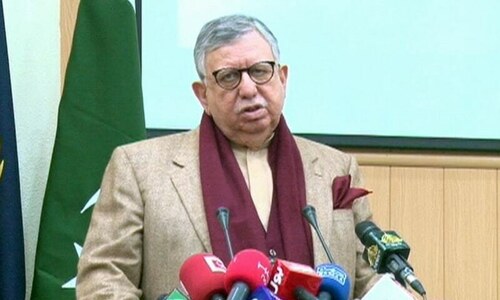ISLAMABAD: The government is working on a set of tax and expenditure measures to provide relief to the urban middle, lower-middle and salaried classes to absorb increasing price shocks.
A meeting of the Macroeconomic Advisory Group presided over by Finance Minister Shaukat Tarin on Thursday considered a few measures that address inflationary pressures on the urban middle class. These proposals would be fine tuned along with fiscal implications over the next couple of days but would be made public after the executive board of the international monetary fund (IMF) approves the revival of its programme and disbursement of over $1 billion.
Informed sources said the meeting discussed changes in the income tax brackets to provide relief to the salaried class in view of healthy tax collection in first six months of the current year. The Federal Board of Revenue authorities were asked to prepare a couple of proposals on tax brackets, fine tune these changes along with revenue impact and their relief impact on taxpayers.
Another proposal was to provide direct subsidy on petrol to those using motorbikes in case the petrol price go beyond the current level. That could be a sort of social safety protection of the lower middle class. The officials said the government was under compulsion from the IMF to keep increasing petroleum levy on key petroleum products but a token system could be introduced based on the Nadra and BISP data to provide direct subsidy on petrol price to bikers.
Measures to address inflationary pressure on the urban middle class discussed
The participants also discussed a broad-based internship programme with the support of the private sector on the Public-Private Partnership (PPP) mode for job creation. This would, however, need an in-depth approach.
The sources said it was felt during the meeting that even a small chunk of about Rs290bn higher than targeted revenue collection could be channelised to provide relief to the salaried, urban and middle and lower middle income groups.
It was also felt that while the poor had been protected through various Ehsaas programmes and subsidies and the industrial rich supported through fiscal and monetary injections by the federal government and the central bank, it was the salaried and urban middle classed that largely faced the brunt of inflationary pressures.
This was also evident from the fact that revised GDP estimates and rebasing showed reasonable economic growth and corporates had shown over Rs900bn profits, a clear sign of revival of economic activities after a negative 1pc growth in FY2020, the growth had been uneven and required to be broad based through relief to the middle class.
An official statement said the meeting discussed the core macro-economic indicators of Pakistan’s economy. “Macroeconomic Advisory Group members commended the efforts undertaken by the current government for economic stability on both fiscal as well as monetary fronts,” the statement said adding that all members shared their satisfaction over the progress of economy. It was highlighted and appreciated by the members that economy is heading in the right direction.
As sustainable macro-economic stabilisation is imperative, therefore consideration to challenges and respective measures for rising global prices has also been discussed. “Various effective measures for providing relief to the public especially urban middle class were discussed during the meeting. Pragmatic solutions were also analysed for dealing with these issues along with maintaining the growth momentum in the economy,” the statement added.
The meeting was attended by former adviser to the PM Dr Ishrat Hussain, Adviser to CM Punjab Dr Salman Shah, Governor SBP Dr Reza Baqir, Nust Dean Dr Ashfaque Hassan Khan, Professor of Economics Dr Rashid Amjad and Director SDPI Dr Abid Qaiyum Suleri. Country Director IGC Dr Ijaz Nabi virtually attended the meeting.
Published in Dawn, January 28th, 2022











































